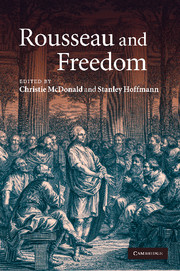Book contents
- Frontmatter
- Contents
- List of illustrations
- Notes on contributors
- Acknowledgments
- List of abbreviations
- Introduction
- PART I
- PART II
- 7 The Social Contract, or the mirage of the general will
- 8 “Par le bon usage de ma liberté”: freedom and Rousseau's reconstituted Christianity
- 9 The constraints of liberty at the scene of instruction
- 10 “Toutes mes idées sont en images”: Rousseau and the yoke of necessity
- 11 Rousseau's ruins
- 12 Can woman be free?
- 13 The subject and its body: love of oneself and freedom in the thought of Rousseau
- PART III
- Bibliography
- Index
8 - “Par le bon usage de ma liberté”: freedom and Rousseau's reconstituted Christianity
Published online by Cambridge University Press: 05 May 2010
- Frontmatter
- Contents
- List of illustrations
- Notes on contributors
- Acknowledgments
- List of abbreviations
- Introduction
- PART I
- PART II
- 7 The Social Contract, or the mirage of the general will
- 8 “Par le bon usage de ma liberté”: freedom and Rousseau's reconstituted Christianity
- 9 The constraints of liberty at the scene of instruction
- 10 “Toutes mes idées sont en images”: Rousseau and the yoke of necessity
- 11 Rousseau's ruins
- 12 Can woman be free?
- 13 The subject and its body: love of oneself and freedom in the thought of Rousseau
- PART III
- Bibliography
- Index
Summary
Though one would scarcely know it from the Anglophone commentaries on his work, Jean-Jacques Rousseau thought and wrote a great deal about religious questions, ultimately producing what amounts to a comprehensive theology. Substantively, Rousseau's religious thought was similar to the deism common to many eighteenth-century philosophers: belief in God, the afterlife, the punishment of the wicked, and tolerance for doctrinal differences. What distinguished him from most of his contemporaries was the political role he envisioned for religion. While most eighteenth-century deists were concerned primarily to divest religious leaders of any political authority, Rousseau hoped to preserve a role for religion in political life. Acutely sensitive to the dangers posed by religion to the freedom of citizens, Rousseau nevertheless believed religion to be indispensable to republican societies. These societies, he argued, must find a way of eliminating the repressive tendencies of established religion while preserving the salutary aspects of religious communion. Toward that end, Rousseau's writings on religion reimagine traditional Christianity in terms that honor individual conscience. Under Rousseau's reconstituted principles of Christian devotion, respect for personal liberty becomes more than an article of political expedience – it is transformed into an obligation of faith.
Rousseau's critique of Christianity can be broadly described as twofold. The more familiar criticism pertains to Christianity's cosmopolitanism – its excessive generality – which Rousseau described as incompatible with the republican requirement of civic unity.
- Type
- Chapter
- Information
- Rousseau and Freedom , pp. 142 - 158Publisher: Cambridge University PressPrint publication year: 2010

